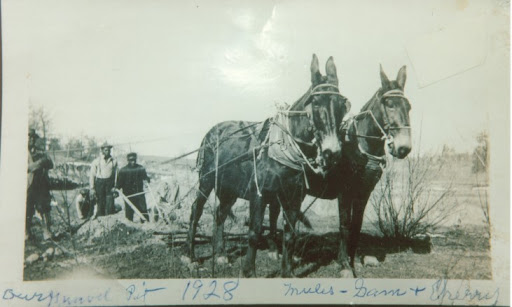They plowed the earth, they hauled heavy loads, they helped weave the fabric of their nation, Dixie. They toiled in the hot, Southern sun, as their ancestors had, during the wars for independence, ‘76 and ‘61, during pioneer days, and as the patchwork of farms covered their native land. They didn’t complain…much. They worked tirelessly and for little reward. They ate from the bounty of the land, the fruit of their toil. They rested in the shade, and drank the cool waters that sprang from the earth.
They touched the earth that is the landscape of Memphis. The Pink Palace knew the sound of their tread. They cleared the land for Memphis Memorial Gardens. They hauled the quartz, onyx and stones used to build the famed Grotto in the midst of the Gardens, all the way from Mullins Station on the N,C & St. L. railroad a few miles distant.
They hauled gravel for construction from pits in east Memphis, off Poplar near Lausanne School and off Walnut Grove on Yates. Moving west with their loads they helped lay the foundation of Memphis’ eastward expansion. They saw farms and woodlands beginning to succumb to progress.
They heard the impatient whistles of railroad locomotives, steamboats and towboats along the riverfront. They noticed the hustle and bustle of automobiles and trucks. The concrete and asphalt which were ‘improving’ the roads, the traffic and the noise which progress brings were alien to their world. These intrusions on their land seemed contrary to what nature had provided for them, and they surely felt the unease which was creeping into their world.
They touched the dirt; their passage was marked by clouds of dust, just as it was when their forebears made their mark on history. Their toil might seem insignificant in the grand scheme of things, but it was their part to play in history. Their time was not ruled by a clock, but by the sun, moon and stars: the rhythm of nature.
Whenever talk turned to Sam and Cherry, you could see a gleam in Dad’s eyes, as if remembering something pleasant, something treasured…something beyond this place and time.
History is often cold and dry, but memories bring warmth to the soul. We remember, and sometimes compare where we are to where we have been, and may sense a loss. But as long as we have the stories, those snapshots of times past, there is comfort in knowing we can hand them down and do our little part to keep alive those times.
Cars and trucks can take us places and haul heavy loads, but the amalgamation of mechanical parts often seems cold. I remember riding horses as a child. There is nothing cold there, but a sense of being connected to nature, warm and comforting. I think I would have liked to have known Sam and Cherry. There’s probably a lot they could have taught me.







An appreciative article, appreciative of Sam and Cherry. However, in the ‘blurb’ which drew me to the article, it is shown that they were mules. But in the article itself, no picture. So the reader, if only shown the article, would never know Sam and Cherry were mules, which is the poignant point of the story. Sometimes it would be good if the articles could indeed include a picture and not just Tom Jefferson’s visage.
Come on man, I knew after one sentence that Sam and Cherry were mules. The uncomplaining (mostly), hard working, builders of the South and symbols of its roots. If you could read that tribute and not know they were mules than you ain’t Southern.
Dear Friend Hubbard,
I am not sure it’s helpful to adopt a ” I’m more Southern than you” attitude.
Do you really think only people with your experiences can be Southern? Sorry, but the South is now more than that. Nowadays, not every Southerner has ridden a horse, or collected crawdads, or run through tobacco fields. But we all love the idea of the South, the sentiment, the individual memories of growing up here.
Chris McLarren
This is a wonderful essay! My Dad and Grandfather often spoke fondly about the old days on the family farm and prominent in those remembrances were the mules.
Thank you!
The gleam in the eye is the treasure. Even if we’ve never seen a mule up close…we can still see the gleam in their eyes when they remember a good mule.